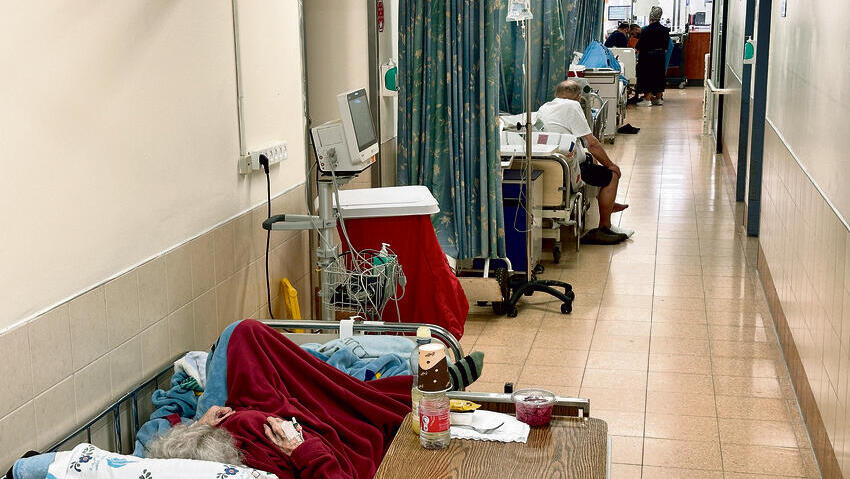Getting your Trinity Audio player ready...
In recent days, there has been a sharp increase in respiratory illness reported in hospitals and clinics. This is primarily attributed to the typical winter illnesses for this season, but experts estimate that with the expected wave of cold weather later this week, this is just the beginning. Similar to previous years, the main illnesses are influenza, RSV (Respiratory Syncytial Virus), and COVID-19.
Read more:
According to the latest respiratory virus monitoring report from the Ministry of Health, "there is an ongoing rise in acute respiratory illness in Israel." but clinicians say they are unable to confirm which of the cases are caused by the COVID virus although the new JN.1 strain that has been rapidly spreading in the world has also been detected in Israel.
Until January 13th, 113 people were admitted to hospitals with influenza, 365 cases of RSV, and 243 cases of COVID-19. Since then, numbers have significantly increased. The report noted that "in the past week, there has been an increase in the overall referral rate to Maccabi Health Services clinics due to respiratory infections. The increase has been observed across all age groups except for infants aged 0-2 years, for whom no significant change has been observed."
According to Dr. Doron Dushnitzky, who heads the Medical Systems Development Department, and coordinates the fields of pediatrics, child development and the fields of ASD and ADHD, "There is indeed an increase in the number of people seeking medical attention due to winter illnesses. This is not significantly different from previous years, and we are mainly dealing with respiratory illnesses. Most cases do not require hospitalization. We are not always able to determine whether it is influenza or COVID-19, but these are respiratory illnesses typical of the winter season.
"It seems that the influenza season has arrived slightly later compared to previous years, and I rely more on the reports from the Ministry of Health. Until mid-December, there were hardly any isolated cases of influenza. We still haven't felt the impact of severe influenza like what we have seen in the southern hemisphere. In recent years, and likely due to COVID-19, the population has become more suspicious of vaccines, and efforts to convince people to get vaccinated have increased.
2 View gallery


Medical staff members assist a patient suffering from the coronavirus disease (COVID-19)
(Photo: Reuters)
"We are trying to reach vaccination rates similar to previous years, but we are not there yet. The data is slightly less favorable compared to previous years, both among healthcare staff and the general population. In the elderly population, the vaccination rate is better, but in other populations, it is less satisfactory. There is still room for vaccination, and this is not the end of the season. The wave could come next week or in a couple of weeks. At the moment, there's no way for us to know."
Prof. Avishay Elis, a senior lecturer in the Department of Internal Medicine and Secretary of the Internal Medicine Association, said, "The situation in the internal departments is extremely challenging. There is an unusually high burden on all hospitals, with a significant influx of patients. What was already difficult has progressively worsened over the years. Some departments have as many as 49 patients, and when a COVID-19 patient is admitted, they require isolation, necessitating separate isolation for each patient.
"In addition, the internal departments are also accommodating individuals from the northern region who cannot reside in their own homes, further adding to the strain. It was crowded before, it is crowded now, and winter has not yet fully begun. The peak is still ahead, and as the weather cools down, the impact will become more evident. Ultimately, we will either witness patients overflowing in the corridors even during this winter, or we won't. It is an inevitable outcome."



